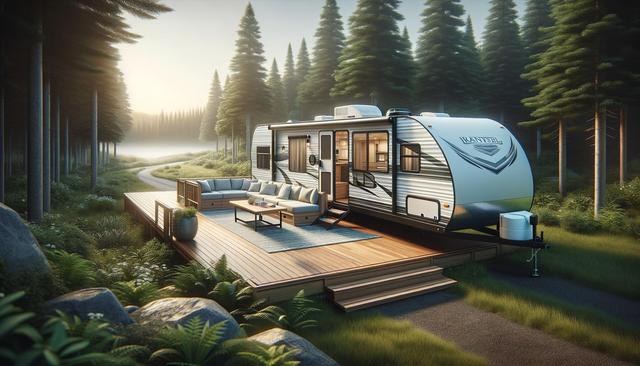What Are Travel Trailers and Why Choose Them?
Travel trailers are towable recreational vehicles designed to provide a mobile living space for travelers. Unlike motorhomes, they are pulled by another vehicle, which offers flexibility and convenience. One of the key advantages is that once you’ve set up your trailer at a campsite, your towing vehicle is free for local exploration. This makes travel trailers particularly appealing for those who enjoy long stays at destinations but still want the option to drive around without packing up everything.
These trailers come in various sizes and layouts, from compact versions suitable for weekend getaways to larger models equipped for full-time living. They often include essential amenities such as a kitchenette, sleeping area, bathroom, and storage space. For people who value comfort while maintaining a connection to the outdoors, travel trailers strike a compelling balance.
Types of Travel Trailers to Consider
There are several types of travel trailers, each catering to different travel styles and needs. Understanding the options can help you choose the right trailer for your adventures. Some of the most popular types include:
- Conventional Travel Trailers: These range in size and offer a wide variety of floor plans and features.
- Teardrop Trailers: Compact and lightweight, perfect for couples or solo travelers.
- Toy Haulers: Designed with space to store and transport recreational ‘toys’ like motorcycles or ATVs.
- Expandable Trailers: Feature sections that extend outward to increase living space when parked.
The choice depends on factors such as how many people will be traveling, the type of vehicle you have for towing, and the kind of travel experience you’re seeking. For example, families may prefer a conventional trailer with a bunkhouse, while solo travelers might opt for a simple teardrop model.
Essential Features to Look For
When shopping for a travel trailer, it’s important to focus on features that will enhance your comfort and convenience. While personal preferences vary, several elements are widely appreciated by seasoned travelers:
- Sleeping capacity and layout: Ensure it accommodates everyone comfortably.
- Kitchen setup: Look for a stove, refrigerator, and ample counter space.
- Bathroom facilities: Some trailers include full bathrooms, while others may offer just a toilet and outdoor shower hookup.
- Storage options: Overhead cabinets, under-bed storage, and exterior compartments can make a big difference.
- Climate control: Heating and air conditioning are essential for year-round travel.
Newer models often come with advanced technology, such as solar panel compatibility, wireless controls for lights and temperature, and upgraded entertainment systems. These features can significantly improve the travel experience, particularly for those spending extended periods on the road.
Tips for Towing and Maintenance
Towing a travel trailer safely requires preparation and the right equipment. Before hitting the road, make sure your vehicle is rated to tow the specific weight of your trailer. A properly installed hitch system, brake controller, and towing mirrors are essential for safety and ease of driving.
Here are a few tips to help with towing and ongoing maintenance:
- Practice driving with your trailer in a safe, open space before embarking on a long trip.
- Distribute weight evenly to maintain balance and stability.
- Check tire pressure and condition regularly, including the spare.
- Perform routine inspections of the hitch, lights, and brakes.
- Winterize your trailer properly if storing it in cold climates.
Regular maintenance helps prevent costly repairs and extends the life of your trailer. Keeping a maintenance log and staying on top of seasonal checkups can make a big difference in the long run.
Planning Travel Adventures with a Trailer
One of the greatest benefits of owning a travel trailer is the freedom to plan trips around your interests and schedule. Unlike traditional vacations that require hotel bookings and fixed itineraries, a travel trailer allows for spontaneous detours and extended stays. Whether you’re visiting national parks, scenic coastlines, or remote mountain areas, your trailer provides a consistent and familiar base.
When planning your trips, consider the following:
- Campground availability and amenities, such as hookups and dump stations.
- Weather conditions and seasonal considerations.
- Access to local attractions, grocery stores, and fuel stations.
- Travel restrictions or regulations related to trailer size and weight.
Apps and online tools can assist with route planning, campground reservations, and even finding places to boondock (camp without hookups). With thoughtful planning, your travel trailer can open up a world of flexible and enriching travel experiences.
Conclusion: Embracing the Travel Trailer Lifestyle
Travel trailers offer a unique blend of mobility, comfort, and adventure. Whether you’re a weekend warrior or a full-time traveler, these versatile vehicles provide a way to explore new places while maintaining the comforts of home. From choosing the right model to learning the ins and outs of towing and maintenance, embracing the travel trailer lifestyle can lead to rewarding and memorable journeys. For those seeking freedom on the road and a deeper connection to their travel experiences, a travel trailer is a valuable companion.




Leave a Reply